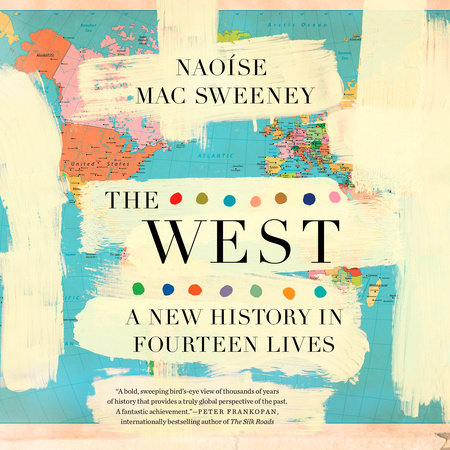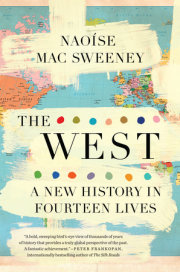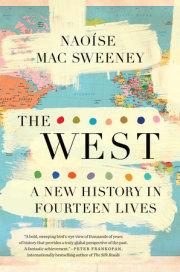The Rejection of Purity
Herodotus
It is absolutely clear that the woman Europa herself came from Asia, and that she never set foot on the lands that are called "Europe" by the Greeks.
Herodotus (late fifth century BCE)
A migrant stands on the beach. He looks out to sea, his mind as well as his gaze reaching out towards his homeland, a continent and a lifetime away. He took his first steps into exile years ago, sailing away from the rough coast of Turkey on an overcrowded boat. He had been running from the persecutions of a tyrant and the fury of a fundamentalist mob, hoping for a bright new future in Europe's most bustling and cosmopolitan city. But when he finally got to the great metropolis, his dreams quickly soured. Where he had once hoped for success, he encountered suspicion, and where he had once imagined opportunity, he found restriction. Later, when the government began to cultivate a hostile environment for migrants and instituted draconian new citizenship laws, he left. And so now here he stands-on another foreign beach, looking for another new start. Maybe this time, he will find what he is looking for.
This story could belong to any number of twenty-first-century migrants, but in this case it belongs to the first of this book's fourteen lives-that of the ancient Greek historian Herodotus. Of course, we can only speculate (as I have here) about how Herodotus felt when he arrived on the shores of southern Italy. Indeed, we know relatively little about the life of the man now widely regarded as the "Father of History." Born in the early fifth century BCE in Halicarnassus (now Bodrum in Turkey), he worked for some years in Athens before living out the final years of his life in the small town of Thurii on the Tarentine Gulf. And it was here, twice displaced and twice resettled, that he wrote his masterpiece the Histories.
The Histories is widely regarded as the earliest work of historical writing in the Western tradition. In the core of the book, Herodotus recounts how, in the years between 499 and 470 BCE (although he focuses mostly on the period 499-479 BCE), a coalition of Greek states fought off the invading armies of the Achaemenid Persian Empire. The Persians had superior numbers, resources, and organisation, and they controlled a vast empire that stretched from modern-day Bulgaria to Afghanistan, and from Egypt to the Black Sea. In contrast, there were hundreds of tiny independent communities that considered themselves to be (to a greater or lesser extent) Greek, squabbling incessantly with one another and eking out a meagre living from their separate territories. Yet against all expectations, the Greeks prevailed and successfully repelled the Persian invaders. It is a story that has captured imaginations across three millennia and remains enormously popular today.
One of the reasons behind the enduring popularity of the Histories is its significance for the imagined history of the West. For many people, it has provided a founding charter for Western Civilisation, offering an ancient precedent for the modern notion of the "clash of civilisations." The opening lines of the prologue certainly seem to fit this script. Herodotus starts the Histories by stating explicitly that his aim is to record the great deeds of both Hellenes and barbarians (by which he means non-Greeks). This immediately implies a binary opposition between the two sides-Greeks and barbarians, Europe and Asia, the West and the East (or perhaps more accurately, the West and the Rest). Herodotus then goes on to offer a backstory, reaching into even more ancient history to set the scene for the conflict. It all started, he tells us, when Phoenician merchants abducted a princess from the Greek city of Argos. The Greeks responded by kidnapping a Phoenician princess, leading to a cycle of intercontinental rapes culminating with the abduction of Helen from Sparta, which led to the Trojan War. The ensuing destruction of Troy, according to Herodotus, was a disproportionate escalation, and it was this, he claims, that really set the Asians against the Greeks (Hdt 1:5).
Herodotus's prologue reads like an early version of the Western Civilisation narrative. The two key ingredients are there. First, we have two implacably opposed sides-Greece (for which, read "the West") and Asia (for which, read "the Rest"). Then we have the historical present being projected back onto past-the Persians conflated with the mythical Trojans, and the Greeks equated with the Achaeans who sacked Troy. Herodotus seems to give us not only an ancient account of "the clash of civilisations" but also an early formulation of the cultural genealogy of the West. At least, this is what he seems to give us.
Many readers have been taken in by this face-value reading of Herodotus. When Samuel Huntington wrote his controversial bestseller, The Clash of Civilisations and the Remaking of the World Order, he defined the key characteristics of a civilisation with reference to Herodotus. According to the political scientist Anthony Pagden, Herodotus's subject in the Histories was "the perpetual enmity between Europe and Asia." And when Zack Snyder released his film 300 in 2007, he sparked controversy by portraying Herodotus's Spartans as white-skinned, freedom-loving Europeans and the Persians as Asians and Africans characterised by both moral degeneracy and physical deformity.
That Herodotus has been misconstrued is understandable. There are indeed plenty of bits of the text that suggest a "clash of civilisations"-type of narrative. But there are also plenty of bits of the text that suggest the opposite. If we read Herodotus carefully, we find that he introduces the notion of a clash of civilisations only to undermine it. We discover that Herodotus did not divide the world into the West and the Rest, nor did he understand history as an unending replay of the same eternal conflict. In short, Herodotus did not invent an early version of the Western Civilisation narrative, nor did he see himself and the Greeks as belonging to a geo-cultural grouping that parallels the modern West. Rather, his entire life's work points in the opposite direction. It is one of history's ironies that, two and a half millennia after his death, Herodotus has so often been used to promote the very ideology of "us vs. them" that he tried to discredit.
Father of History, Father of Lies
Although we sometimes know him now as the "Father of History," Herodotus was not the first historian. Mesopotamian historiography predates him by more than a millennium, and the first historical works in the ancient Greek language appeared almost two hundred years before he was born. But while Herodotus did not invent history, he did do a good job of reinventing it. He focused less on the telling of sequential events and more on patterns of historical causality, shifting the emphasis from the "what" to the "why."
The Histories do, of course, offer an account of what happened in the Greco-Persian Wars, detailing the various events and episodes of the conflict. The story broadly runs thus: The fighting broke out with the Ionian Revolt in 499 BCE, a rebellion against the Persian Empire led by the Ionian Greek cities of Asia Minor and supported by the Athenians (as well as other Greek city-states in the Aegean). The rebellion was eventually crushed, and the Persians began to look westwards. When the Persian king Darius launched an invasion of peninsular Greece in 492 BCE, he was defeated by an Athenian-led force at the Battle of Marathon. With revolts elsewhere in the empire, it was a full decade before the second Persian invasion of Greece was launched, in 480 BCE, this time under Darius's son Xerxes. As it marched down through the Greek peninsula, Xerxes's army was briefly checked at Thermopylae, where three hundred Spartans famously made their last stand. But the Persians eventually reached Athens and sacked it, killing many of its inhabitants and carrying off its greatest treasures. Then in a surprising turn of events, the Persians suffered a catastrophic double defeat-first at sea at the Battle of Salamis, and then on land at the Battle of Plataea. With their forces in disarray and the ruins of Athens smouldering behind them, they decided to cut their losses and return home.
Why did things turn out this way? In order to get at this slippery question, Herodotus found himself expanding his view ever outwards-opening up a broader and broader perspective and setting events in a wider and wider context. You can't really understand why Persia sacked Athens, he reasoned, unless you appreciate the backstory of Perso-Athenian diplomatic relations. And you cannot fully appreciate Perso-Athenian diplomatic relations unless you know something of the internal political structures of both states. And you cannot really grasp the internal political structures of any state without having some sense of that state's history, its development, and ultimately its origins. As you can imagine, the tendrils of Herodotean explanation reached ever outwards.
As a result, the Histories offers us not only an account of the Greco-Persian Wars, but also Herodotus's ideas about Persian history (although some of this is evidently based as much on conjecture as it is on solid evidence), including the foundation of the empire and an explanation of its administration. The narrative also spirals out into vivid ethnographic descriptions of Persian culture and society, as well as individual biographies and character studies of key figures from Persian history. Herodotus offers this rich level of detail not only for the Persians, but also for each of the many peoples who lived within the Persian Empire, from the Egyptians in the south to the Scythians in the north, and from the Indians in the east to the Greeks in the west. Herodotus's treatment of the Greeks is, of course, somewhat different from his treatment of other groups. Writing in the Greek language for a primarily Greek audience, Herodotus did not need to explain the basics of Greek culture and customs. But he did recount the individual histories of several Greek states, discussing their unique trajectories of development and highlighting each nation's particular characters.
This focus on the "why" led to his Histories being both grand in scope (its content spanning many hundreds of years and thousands of kilometres) and rich in detail (with anecdotes ranging from the sex lives of kings to the maritime mishaps of fishermen). So while Herodotus ostensibly recounts the story of the Greco-Persian Wars, in the telling of it he treats us to a great smorgasbord of historiographical delicacies, including ethnographic exposition (did you know that the Scythians buried their kings only after wrapping them in wax?) and philosophical debate (such as the time when the Persians discussed the best form of government-interestingly, they eventually decided on monarchy by voting for it!), geographical theorising (Herodotus waded in, both literally and figuratively, on the debate about the source of the Nile River) and investigative journalism (thanks to an anonymous source, we hear of secret messages passed by means of hidden tattoos).
The richness and variety of the Histories led-perhaps inevitably-to the second of Herodotus's nicknames. While Cicero, writing some four centuries after Herodotus's death, may have called him the "Father of History," some two centuries later still, Plutarch dubbed him the "Father of Lies." Plutarch felt that Herodotus's stories were simply too fantastical, too whimsical, and too unashamedly entertaining to be factually true. On this point, Plutarch is partly right. Some of Herodotus's stories are certainly far-fetched-such as the tale of the gold-digging ants of India, or the rumour that some people living in the Sahara had dogs' heads. Other strange-sounding tales might have originally started off as cultural misunderstandings. One likely candidate for this is the story that Scythians milk their mares by blowing air into their vaginas with bone flutes; another is the idea that Babylonian women all served as temple prostitutes at least once in their lives. But Herodotus himself knew that not all of his tales were factually accurate. He often prefaced his more fantastical stories with elaborate disavowals, presenting them not in his own authorial voice but as a secondhand report. Such passages are peppered with phrases such as "some people say . . ." or "the locals claim . . ." Herodotus did not believe everything he heard, and he did not expect his audience to either.
A healthy dose of critical close reading would not, however, have done much to salve Plutarch's ire. He had a deeper reason for suspecting Herodotus. Fundamentally, he found the Histories far too evenhanded towards the Persians, and far too positive in its portrayal of non-Greeks. Herodotus, according to Plutarch, was quite obviously a philobarbaros (a lover of barbarians), and nothing he wrote could ever be trusted. Just as problematic was Herodotus's willingness to criticise the Greeks. For while he described the bloodthirsty madness of the Persian Cambyses and the hubristic cruelty of Xerxes, he also wrote about the selfish ambitions of the Milesian nobleman Aristagoras and the greed of the Athenian general Themistocles. For the patriotic Plutarch, living in a Greece that had been reduced to a province of the Roman Empire, this was an affront to his nostalgic ideal of Hellenism.
So, who was Herodotus really-the Father of History or the Father of Lies? Was he a fantasist, a barbarian apologist, and a wily spinner of tall tales? Or was he a scientific innovator, pushing the limits of human knowledge by reconceptualising the human relationship with the past? Perhaps most importantly for us in this book, did he formulate an early vision of the proto-West that forms the basis for our modern notion of the West today? Did Herodotus give us our blueprint for the grand narrative of Western Civilisation? The answers to these questions lie somewhere between the life story of Herodotus the human and the literary texts of Herodotus the historian. But for all the richness of the biographies he writes in the Histories, we know frustratingly little about the life of its author.
We know that Herodotus was born in the mid-fifth century BCE in Halicarnassus, on the Aegean coast of what is now Turkey. Although Halicarnassus was officially a Greek polis (city-state), it had a mixed population and also celebrated an indigenous Anatolian heritage. Herodotus's own family offers an illustration of the city's cultural mix. The name "Herodotus" is Greek, as is the name of his mother, Dryo. Yet several other members of the family had names derived from the Anatolian language of Carian, including Herodotus's father, Lyxes, and his cousin the poet Panyassis.
As a young man, Herodotus may have been more interested in politics than history. He had some kind of disagreement with Lygdamis, the hereditary ruler of the city, and was forced to flee to the nearby island of Samos. At some stage Herodotus returned, became involved in the coup that toppled Lygdamis, and supported the establishment of a new regime in the city. But before long, he was forced out again-this time by the anger of a pro-Lygdamian mob. In the years that followed, Herodotus seems to have made good use of his exile, travelling widely across the ancient world. Peppered throughout the Histories we find personal anecdotes and eyewitness stories. Herodotus tells us that he explored the sights of Egypt, sailing down the Nile as far as Elephantine; marvelled at the busy harbours and cosmopolitan markets of Phoenician Tyre; and saw with his own eyes the fabulous decorations of the temples of Babylon. If his writings are to be believed, Herodotus would have been an exhausting travel companion-quizzing tour guides for information, haggling with street vendors, and bothering everyone from local dignitaries to humble water sellers for their stories. Perhaps unsurprisingly, his writing also demonstrates an intimate familiarity with Anatolia, including not only its Aegean coasts in the west but also its northern regions bordering the Black Sea and the area of the Hellespont. On the Greek mainland, he seems to have firsthand knowledge of several areas including Sparta, Delphi, and Boeotia, as well as, of course, Athens.
Copyright © 2023 by Naoíse Mac Sweeney. All rights reserved. No part of this excerpt may be reproduced or reprinted without permission in writing from the publisher.






